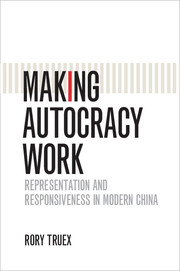Book contents
7 - The Evolution of the NPC
Published online by Cambridge University Press: 13 October 2016
Summary
RWB and Institutional Change
The current version of the NPC is a “representation within bounds” parliament. Deputies convey citizen grievances but shy away from sensitive political issues, and the government in turn displays partial responsiveness to their concerns. Deputies are socialized into this behavioral pattern and are punished or rewarded depending on the quality of their representative behavior. They also enjoy substantial rents for their services.
The analysis in this book is focused on a single snapshot in time, the 11th NPC (2008–12) under the Hu-Wen administration. This decision was made largely on the basis of data availability, but it leaves open the question of how the CCP regime arrived at this equilibrium. How has representation in the NPC changed over time? How long has the representation within bounds system been in place, and what precisely spurred its creation? And importantly, can we expect it to continue in the future?
The purpose of this chapter is to explore and explain the historical evolution of the National People's Congress. I will use the ideas from the formal theory in Chapter 2 to aid in the presentation and interpretation of the history. This approach has been referred to as an “analytic narrative” or a “theory guided narrative” (Bates et al. 2000; Buthe 2002; Levi 2002; Capoccia and Kelemen 2007), and it can be helpful in assessing the plausibility of a particular framework and identifying relevant actors and trends (Buthe 2002). In line with rational-choice institutionalism, I ascribe to the view that institutions can be manipulated to meet the ends of different political actors (Shepsle 2006; Pepinsky 2014). I will also draw on concepts developed by proponents of historical institutionalism, particularly the idea that institutional development is often the result of rapid change followed by institutional reproduction (Thelen 1999; Capoccia and Kelemen 2007).
Recall from the model in Chapter 2 that for the Autocrat, the ideal level of representation is a function of the probability of a revolution being successful, π. At extremely low values of π, the Citizen cannot credibly threaten the regime, and there is no need for policy responsiveness. The Autocrat can get away with minimal representation and prefers the Stable Nonresponsive equilibrium E2.1.
- Type
- Chapter
- Information
- Making Autocracy WorkRepresentation and Responsiveness in Modern China, pp. 158 - 175Publisher: Cambridge University PressPrint publication year: 2016

